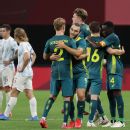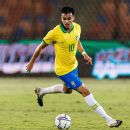Spain’s class too much for Australia but Olyroos’ Olympic hopes are still alive
olyroos #olyroos

Spain were able to control the match against Australia with young stars like Pedri dominating possession. Masashi Hara/Getty Images
Spain has moved top of Group C and put themselves in the box seat to advance to the quarterfinals of the Olympic men’s football at the Tokyo Games after grinding down Australia to seal a 1-0 win at the Sapporo Dome.
After failing to penetrate the Olyroos’ bunkered-down defences for almost the whole game, Spain’s dominance of the contest was rewarded in the 81st minute when Mikel Oyarzabal rose to meet a cross from Marco Asensio — securing both the win and his nation’s first goal at an Olympics in 21 years.
Australia now falls to second in the group, clear of third-placed Argentina on goal difference and with Egypt next up on Wednesday.
– Men’s Olympic soccer bracket and fixtures schedule- Stream ESPN FC Daily on ESPN+ (U.S. only)- Don’t have ESPN? Get instant access
The Dam Breaks
You wouldn’t have got any prizes for guessing it coming into Sunday evening, but Spain absolutely dominated play throughout the entire 90 minutes in Sapporo. Across the first half, coach Luis de la Fuente’s side held 73% of the ball and had nine shots (three on target) as their opponents failed to register a single effort on the goals of Unai Simon. By the end of the 90, the possession stats remained the same, while the Spanish had added a further six shots and two on target while the Australians’ added two efforts.
Nonetheless, as has become somewhat of a habit for their national teams regardless of age group, Spain were frustrated in their efforts to turn this dominance on the stat sheet into control on the scoresheet: the Olyroos’ early defensive 4-4-2 largely able to absorb the Spanish forays forward.
Despite their first-half onslaught, and for all of their control of possession and territory, Spain were largely unable to create clear chances thanks to a combination of determined Australian defending and their own lack of killer instinct; Oyarzabal’s effort that hammered off the crossbar in the 24th minute one of the few notable efforts mustered. However, while chances in transition ostensibly should have been there for coach Graham Arnold’s to exploit as a result of this — an area De la Fuente had expressly identified as a strength heading into the contest — they were a frustratingly absent facet of the Olyroos’ play.
There was very little positivity or intent in attack with unified purpose from Australia when they got a rare opportunity to get on the ball and work to get forward. There seemed to be an air of caution about being caught out of position and exploited present even with ball at feet. And with the threat of the Spanish taken up a notch in the opening 15 minutes of the second half — marked by a lethal switch of Dani Olmo to the middle of the park from his position on the wing — the move of Arnold to turn his back four into a back five by replacing attacker Lachlan Wales with centre-back Kye Rowles signalled an increase in the conservatism.
Any doubt surrounding this resolve was then removed 10 minutes later when holding midfielder Keanu Baccus was brought on to replace the more attack-minded Riley McGree. Lightning-quick Dylan Pierias, his side’s most likely player to punish Spain in a rapid move in transition — their best avenue to goal at this point — was left on the bench.
Going completely backs-to-the-wall for 30 minutes against any opposition is hard enough, but against a team with Spain’s talent it felt inevitable that it would backfire. Expected, if you will. And backfire it did in the 81st minute when Oyarzabal struck. The goal prompted somewhat of an attacking shift from Arnold, bringing attacker Nick D’Agostino on for central defender Thomas Deng, but given the proceeding substitutions made with the intent of holding out for a point, there was little tactical scope for the Olyroos to mount a comeback.

6hSamantha Lewis

3dJoey Lynch

5dTor-Kristian Karlsen
2 Related
The Silver Linings
After the highs that came from the win over Argentina, the defeat against Spain inevitably serves to deflate the mood surrounding the Olyroos. However, even with the above reservations about the way that the plan to achieve it was ultimately executed, it must also be said that there is little shame in playing for a draw against a side with the quality of Spain. Despite the profligacy of La Roja giving them a giant assist, this counts for a 1-0 defeat as well.
For while Argentina’s ranks from the previous game may have been largely devoid of the star power that the nation’s reputation may have promised, there could be no mistaking the world-class talent at the disposal of De la Fuente. As had been the case for A-League teams that were home to Olyroos, Spanish clubs had been obligated to release their players for the tournament, giving him his pick of the nation’s best home-grown talent.
Six members of his starting XI against the Australians — Eric García, Pau Torres, Pedri, Simon, Mikel and Dani Olmo — featured for the senior national team at Euro 2020 and this is a Spanish generation that won the U21 Euros in 2019. Even missing the injured Dani Ceballos and Oscar Mingueza, the fearsome depth available to the 1992 gold medallists was perfectly demonstrated when they threw Real Madrid attacker Asensio on for Valencia’s Carlos Soler in the 68th minute.
Thus, disappointing as the result may be in the immediate aftermath, the ability of an Australian U23 side to hold a team with the firepower of this Spanish unit to a 1-0 lead would have seemed fantastical as recently as 12 months ago — the growth and improvement of Australia’s youth as a result of their increase in minutes across the A-League remarkable in its scope.
Despite what it may have appeared after the retirement of its Golden Generation, Australia never really stopped producing players that could take it up to the world’s best — they were simply growing up in a domestic scene that was built in a manner that sometimes felt as if it was actively working against their development. After defeating Argentina and holding Spain to a 1-0 win, this group should be sending a clear message to Australian officials about what can be accomplished by its youth when they’re put in a position to succeed.
Australia displayed enough skill and spirit against Spain to show that they still have a future at the Tokyo Olympics and beyond. ASANO IKKO/AFP via Getty Images What’s Next?
Falling to second place in the group in the wake of the defeat, the stakes for the Olyroos ahead of their clash with Egypt couldn’t be clearer. Win, and they’re through to the next round. Draw and they need Spain to defeat or draw with Argentina to ensure progression. Lose, and they’re coming home.
Ostensibly, the Egyptians will present the easiest opponents that Arnold’s side will have thus far faced in Tokyo; the Junior Pharaohs, despite their status as African powers, not carrying with them the same level of grandeur as Argentina and Spain. But, as displayed by their determined 0-0 draw with Spain and narrow 1-0 loss to Argentina on Sunday, coach Shawky Gharieb’s side is one worthy of respect and careful consideration.
Their back four features three members of Egypt’s 2018 World Cup squad in goalkeeper Mohamed El Shenawy, centre-back Mahmoud Hamdy, and centre-back and captain Ahmed Hegazi. The 2019 Africa U23 Cup of Nations winners are a strong team and may even enter favourites against the Australians. Knowing that they must win to stand any chance of progression to the next stage of the competitions, they will also throw everything they have at Arnold’s team.
Compounding the difficulty for the side in Green and Gold, they will also be without their standout player of the tournament thus far in wing-back Nathaniel Atkinson, as well as McGree and overage striker Mitch Duke, after the trio picked up suspensions for yellow card accumulation against Spain.
Nonetheless, with their chances of advancement still in their own hands and having already rubbished the low expectations many had bestowed upon them heading to Tokyo, the Olyroos have a strong chance of making good on their coach’s proclamations of Group C at the Olympics not being the Group of Death, but the Group of Dreams.